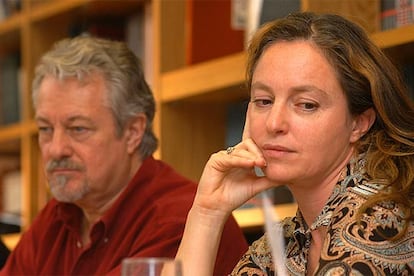Actor and cultural manager José Manuel Gorospe dies at 81.

José Manuel Gorospe is one of those figures who has spanned sixty years of Spanish theater from different positions, professions, and attitudes; always, of course, working for the benefit of the work, for the growth and prestige of the performing arts, to which he devoted himself from a very young age, in the 1970s, as founder and director of the Teatro de Cámara del Gran Kursaal in San Sebastián, the city where he was born in 1943. This Thursday, Gorospe died in Madrid at the age of 81.
In that decade, Gorospe also joined Los Goliardos , one of the most important groups in Spanish independent theatre, performing administrative and technical functions. He later worked at Producciones Teatrales Manuel Collado, one of the most prominent stage professionals of the 1970s and 1980s.
As a cultural manager, at a time when that label didn't exist, he organized the first San Sebastián Theater Festival, better known as the San Sebastián Zero Festival. This was a time when he also enjoyed working as an actor, as it was one of the many roles that interested him in the film and stage profession. In fact, he served extensively as a technical expert, producer, cultural manager, dubbing actor, and as a panelist with each of the many friends and acquaintances he made in his profession.
In cinema he made his feature film debut with Pedro Lazaga in Posición avanzada (1966), with Pedro Olea he worked in Días de viejo color (1968), Akelarre (1984) and Bandera negra (1986), and with José A. Zorrilla in A los cuatro vientos (1987).

For five years, Gorospe was the technical director of the San Sebastián Film Festival's festival center (Teatro Victoria Eugenia). He combined this role with, for example, producing key works during the transition to theater , such as Calderón de la Barca's The Lady of Alexandria , performed by the Aurora Bautista Company. The show reopened in Madrid's rebuilt Teatro Español in 1980 after one of its many fires.
Later, in public administration, the San Sebastián native served as superintendent at the Mérida Theater Festival and the Segovia Music, Theater, and Dance Festival; he was manager of the Spanish National Ballet, directed by Antonio; and worked as head of production at the then-newly created Lyric Production Unit at the Teatro de la Zarzuela.
Beginning in 1986, he became more deeply involved in the production of shows, such as Miguel de Unamuno's Phaedra , which premiered at the Roman Theatre in Mérida. This work was combined with his responsibility for completing the renovation of Bilbao's Arriaga Theatre, overseeing its technical commissioning. Gorospe produced Jesús Guridi's opera Amaya, directed by Enrique García Asensio, for the Basque Government, which reopened the theatre. Shortly after, he was appointed assistant director of the Palau de la Música i Congresos in Valencia.
In 1990, he became the manager of the cultural department of the Quinto Centenario State Society and shortly afterward advised on the completion of the new Teatro de Madrid, owned by Madrid City Council. He was appointed director of that institution and proposed the general operating plans, proceeded to select the staff, and began management, which was important because in 1992 the venue hosted the opera program for Madrid's European Capital of Culture. Two years later, he returned to San Sebastián as project auditor and technical advisor for the construction of the Kursaal Conference Center.
On his way back and forth between his hometown and Madrid, Gorospe resumed his production work in the capital with Bertolt Brecht's The Evitable Rise of Arturo Ui , which premiered at the Teatro Bellas Artes under the stage direction of José Carlos Plaza . From there, he moved on to the Compañía Nacional de Teatro Clásico as production director, a position he also held at the Teatro de la Zarzuela. In 2004, he joined the Directorate General for Cultural Promotion of the Community of Madrid as festival director. It should not be forgotten that, within the lyrical sector, he was directly responsible for 34 opera productions and 33 zarzuela productions.
Gorospe, who would have turned 82 next Wednesday, left orders for his body to be donated to science, so, as he wished, there will be no funeral home, farewell, or memorial service, although friends have already begun organizing a celebration of his friendship.
EL PAÍS


%3Aformat(jpg)%3Aquality(99)%3Awatermark(f.elconfidencial.com%2Ffile%2Fbae%2Feea%2Ffde%2Fbaeeeafde1b3229287b0c008f7602058.png%2C0%2C275%2C1)%2Ff.elconfidencial.com%2Foriginal%2Fee4%2F4fb%2Fdb8%2Fee44fbdb86c159d91797a049ee376a36.jpg&w=1280&q=100)

